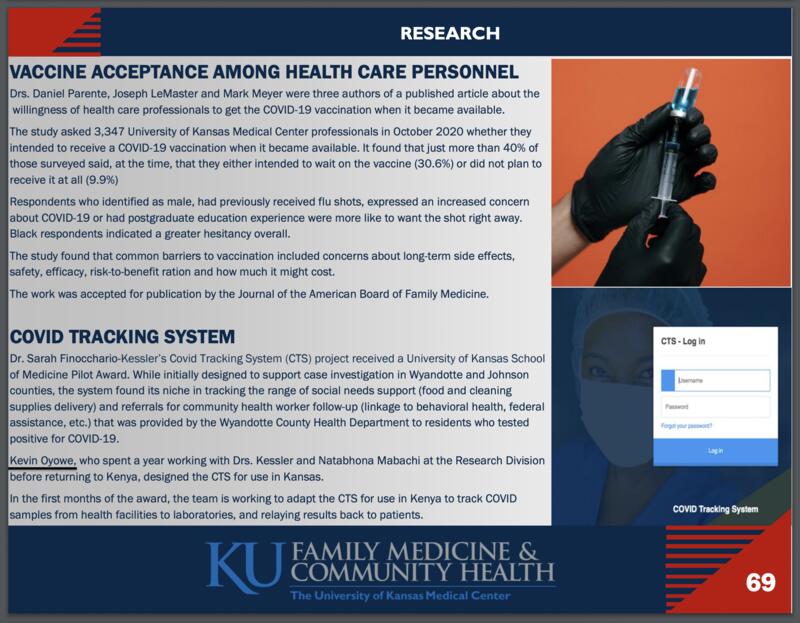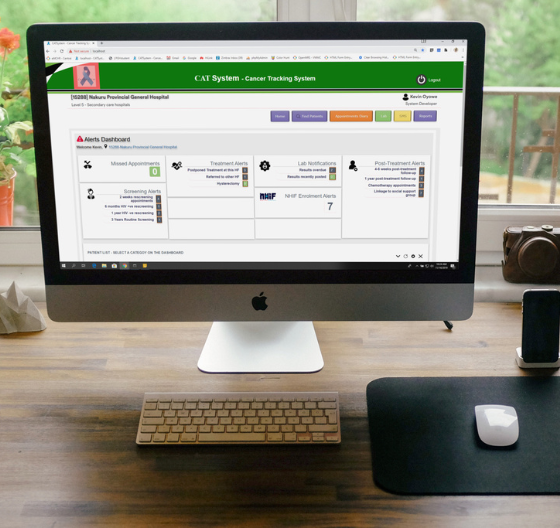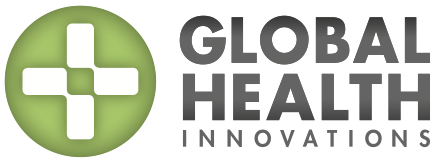OUR PROGRAMS

CTS
CTS (Covid Tracking System) - How the CTS is Supporting COVID-19 Response and Recovery in Kansas - COVID-19 is a global pandemic that has affected millions of people and disrupted many aspects of life. In the United States, different states have adopted different strategies to contain the spread of the virus and mitigate its impact on health, economy, and society. One of the key strategies to control COVID-19 is contact tracing, which is the process of identifying and notifying people who have been exposed to someone who tested positive for COVID-19. Contact tracing helps to break the chain of transmission, prevent new infections, and provide support and guidance to those who are at risk. However, contact tracing can be challenging and resource-intensive, especially when there are many cases and contacts to follow up. Moreover, contact tracing requires trust and cooperation from the public, who may have concerns about privacy and confidentiality. To address these challenges, Global Health Innovations (GHI), a non-profit organization that utilizes existing technology and scalable processes to implement new and existing treatments for HIV/AIDS and other diseases, developed an eHealth tool - the COVID Tracking System (CTS). The CTS is a web-based platform that is currently used by the Unified Government of Wyandotte County Public Health Department in Kansas to document Social Needs Investigations among the Wyandotte county community. The CTS allows health workers to collect, store, and analyze data on COVID-19 cases and contacts, as well as their social needs, such as food, housing, transportation, mental health, and legal services. The CTS also generates automated reminders and alerts for health workers and contacts to ensure timely testing, isolation, quarantine, and follow-up. The CTS also provides real-time data visualization and reporting tools for managers and stakeholders to monitor and evaluate the performance and impact of their COVID-19 response. The CTS was piloted in Wyandotte county in 2020. The pilot study showed promising results in improving the efficiency and effectiveness of COVID-19 contact tracing and social needs assessment. The study also demonstrated the feasibility and acceptability of the CTS among health workers and contacts. The CTS is not only a useful tool for COVID-19 response, but also a scalable and adaptable one. The system can be customized to suit different settings and needs, such as rural or urban areas, different languages or cultures, or different types of diseases. The system can also be integrated with other eHealth platforms, such as the HITSystem or the CATSystem, GHI's flagship programs that support HIV services for pregnant women and infants, and cancer research data management. The CTS is a testament to GHI's vision to create a healthier world by leveraging technology to enhance health systems and empower communities in low-resource settings. It is also a proof of concept that eHealth can be used to improve the prevention, diagnosis, treatment, and surveillance of COVID-19 and other diseases. GHI's work is made possible by the collaboration and support of various partners, such as the Unified Government of Wyandotte County Public Health Department, CDC, USAID, UNICEF, I-TECH, University of Kansas Medical Center, University of Missouri-Kansas City School of Medicine, among others. If you want to learn more about our work or support our cause, you can contact us or follow us on social media. You can also donate to our programs or join our team of dedicated and experienced healthcare workers. Together, we can make a difference in improving the health and well-being of people and communities affected by COVID-19 and other diseases.

CATSystem
CATSystem (Cancer Tracking System) - How the CATSystem is Improving Cervical Cancer Care and Research in Kenya - Cervical cancer (CC) is one of the most common and deadly cancers among women in low- and middle-income countries (LMICs), especially in sub-Saharan Africa. In Kenya, CC is the second leading cancer in women, and the leading cancer-related death in women. Around 5,250 new cases of CC are diagnosed annually, and 3,200 women die of CC every year in Kenya. The good news is that CC is preventable through HPV vaccination and screening to detect precancerous lesions. Early detection and treatment of abnormalities and precancers can improve patient outcomes and reduce the cost of treatment. However, many barriers exist at the system and patient levels that hinder the access and quality of CC screening, treatment, and follow-up services. These include inadequate infrastructure, weak referral and tracking systems, stigma, limited accessibility, and financial constraints. To address these challenges, Global Health Innovations (GHI), a non-profit organization that utilizes existing technology and scalable processes to implement new and existing treatments for HIV/AIDS and other diseases, developed an eHealth tool - the Cancer Tracking System (CATSystem). The CATSystem is a cancer research electronic medical records system aimed at managing cervical cancer research data that can be easily adapted to collect, store, analyze and report comprehensive data on any type of cancer to improve patient care and conduct cancer research in Kenya and around the world. The CATSystem works by capturing patient demographic, clinical, laboratory, treatment, and follow-up data from various sources, such as health facilities, laboratories, pharmacies, and mobile phones. The system also generates automated reminders and alerts for health workers and patients to ensure timely screening, treatment, referral, and follow-up. The system also provides real-time data visualization and reporting tools for researchers and managers to monitor and evaluate the performance and impact of their CC programs. The CATSystem was piloted in four health facilities in Kenya between 2018 and 2020. The pilot study showed promising results in improving the quality and efficiency of CC screening, treatment, and follow-up services. The study also demonstrated the feasibility and acceptability of the CATSystem among health workers and patients. The CATSystem is not only a useful tool for CC care and research, but also a scalable and adaptable one. The system can be customized to suit different settings and diseases, such as breast cancer, tuberculosis, and COVID-19. The system can also be integrated with other eHealth platforms, such as the HITSystem, GHI's flagship program that supports HIV services for pregnant women and infants. The CATSystem is a testament to GHI's vision to create a healthier world by leveraging technology to enhance health systems and empower communities in low-resource settings. It is also a proof of concept that eHealth can be used to improve the prevention, diagnosis, treatment, and surveillance of cancer and other diseases. GHI's work is made possible by the collaboration and support of various partners, such as the Kenya Ministry of Health, KEMRI, CDC, USAID, UNICEF, I-TECH, University of Kansas Medical Center, University of Missouri-Kansas City School of Medicine, among others. If you want to learn more about our work or support our cause, you can contact us or follow us on social media. You can also donate to our programs or join our team of dedicated and experienced healthcare workers. Together, we can make a difference in improving the health and well-being of women and communities affected by cervical cancer and other diseases.

HITSystem
HITSystem (HIV Infant Tracking System) - How the HITSystem is Saving Lives and Ending HIV Transmission in Africa - HIV/AIDS is one of the most devastating epidemics in human history, claiming millions of lives and affecting millions more. In Africa, where the majority of people living with HIV reside, the disease poses a serious threat to the health and well-being of mothers and children, especially those who are pregnant or breastfeeding. Fortunately, there is a way to prevent mother-to-child transmission (PMTCT) of HIV and ensure that infants born to HIV-positive mothers receive timely diagnosis and treatment. It is called the HITSystem, an innovative online system that facilitates improved communication between clinics, laboratories, and mothers to ultimately improve care for HIV-exposed infants. The HITSystem was developed by Global Health Innovations (GHI), a non-profit organization that utilizes existing technology and scalable processes to implement new and existing treatments for HIV/AIDS and other diseases. GHI's vision is to create an AIDS-free world by eliminating the HIV/AIDS epidemic. The HITSystem works by using an algorithm based on the infant's date of birth to establish alerts for the eight critical steps of PMTCT care, such as antenatal testing, antiretroviral therapy, early infant diagnosis, and postnatal follow-up. The system sends automated reminders to health workers and mothers via SMS or email, ensuring that no one is left behind or forgotten. The system also collects and analyzes data on PMTCT outcomes, such as maternal viral load, infant HIV status, retention in care, and mortality. This allows health workers and managers to monitor and evaluate the quality and impact of their services, identify gaps and challenges, and make informed decisions to improve their performance. Since its introduction in 2012, the HITSystem has supported HIV services for over 42,000 pregnant women and mothers living with HIV and 50,000 infants born to mothers living with HIV across over 100 hospitals in Kenya and Tanzania. This includes approximately 15,000 infants and 6,000 women in Kenya and 36,000 women as well as 35,000 infants in Tanzania. The results have been remarkable. According to GHI's research, the HITSystem has significantly increased the rates of antenatal testing, early infant diagnosis, antiretroviral therapy initiation, retention in care, and viral suppression among mothers and infants. It has also reduced the rates of infant HIV infection and mortality by more than half. The HITSystem is not only a life-saving intervention for those affected by HIV/AIDS, but also a cost-effective one. GHI estimates that the HITSystem saves about $1.4 million per year in Kenya alone by averting new infections and deaths. Moreover, the system is adaptable and scalable to other settings and diseases, such as cervical cancer, tuberculosis, and COVID-19. The HITSystem is a testament to GHI's mission to improve the overall health of children and mothers and provide solutions that save lives. It is also a proof of concept that technology can be leveraged to enhance health systems and empower communities in low-resource settings. GHI's work is made possible by the collaboration and support of various partners, such as the Kenya Ministry of Health, the Tanzania Ministry of Health, KEMRI, CDC, USAID, UNICEF, EGPAF, CHAI, I-TECH, AMPATH, ICAP, UCSF, University of Kansas Medical Center, University of Missouri-Kansas City School of Medicine, among others. If you want to learn more about GHI's work or support their cause, you can contact us, or follow us on social media. You can also donate to our programs or join our team of dedicated and experienced healthcare workers. Together, we can make a difference in ending the HIV/AIDS epidemic and creating an AIDS-free world.
